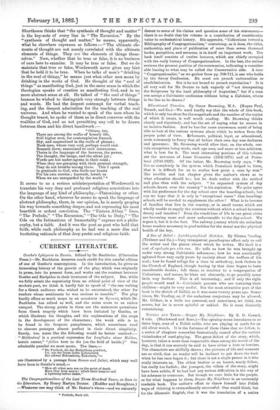CURRENT LITERATURE.
Goethe's lphigenie in Tauris. Edited by Dr. Bachheim. (Clarendon Press.)—Dr. Buchheim deserves much credit for this careful edition of one of Goethe's masterpieces. In the introduction, he gives an interesting history of the growth of the play, which was originally in prose, into its present form, and works out the contrast between Goethe and Euripides in their treatment of the subject. Bat, while we fatly admit the superiority from an ethical point of view of the modern poet, we think it hardly fair to speak of "the one writing for a Greek audience who wished to be entertained, the other for readers whose sentiments he was anxious to ennoble." The play hardly offers as much scope to an annotator as Egmont, which Dr. Buchheim has edited so well, and the notes seem to us rather unequal. The strong points in them are the numerous quotations from Greek tragedy which have been imitated by Goethe, or which illustrate his thoughts, and the explanations of the steps in the development of the characters ; the weak side is to be found in the frequent paraphrases, which sometimes tend to obscure passages almost perfect in their direct simplicity. Surely, too, notes like the following would be better omitted :—
• " Heldenlauf is a poetical expression for Laufbahn eines Heiden, heroic career," "fallen here to die (on the field of battle.)" One admirable parallel we must quote. The lines,—
" Die Freiheit, die das Heiligthum gewahrt, 1st, wie der letzte lichte Lebensblick Des schwer Brkrankten, Todesbote,"— are illustrated by a passage from Romeo and Juliet, which may well have been in Goethe's mind,— "How oft when men are on the point of death Have they been merry which their keepers call A lightning before death."
The Congregationalism of the Last Three Hundred Years, as Seen in its Literature. By Henry Martyn Dexter. (Hodder and Stoughton.) —Whatever one may think of Mr. Dexter's views—and we naturally
• Prelude, Book ail
demur to some of his claims and question some of his statements— there is no doubt that his volume is a contribution of considerable value to ecclesiastical history. His appendix, "Collections toward a Bibliography of Congregationalism," containing, as it does, the titles, authorship, and place of publication of more than seven thousand books, pamphlets, and sermons, is in itself an important work. The book itself consists of twelve lectures, which are chiefly occupied with the early history of Congregationalism. In the last, the author reviews the present position of the communion, indicating a consider- able leaning to what may be called the Conservative side. A true "Congregationalist," as we gather from pp. 709-711, is one who holds by the Savoy Confeseion. He must not preach universalism or annihilationism. Bat is he not bound to preach reprobation ? It is all very well for Mr. Dexter to talk vaguely of "not interpreting the Scriptures by the hard philosophy of Augustine," bat if a man can accept a Calvinistic confession without being a Calvinist, where is the line to be drawn ?


































 Previous page
Previous page